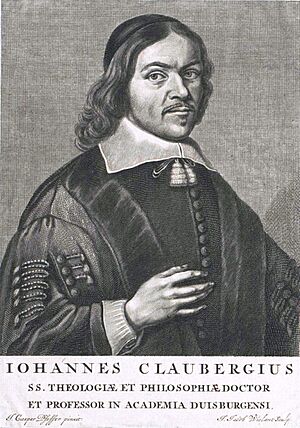Johannes Clauberg facts for kids
Quick facts for kids
Johannes Clauberg
|
|
|---|---|
 |
|
| Born | 24 February 1622 |
| Died | 31 January 1665 |
| Era | 17th-century philosophy |
| Region | Western philosophy |
| School | Cartesianism |
Johannes Clauberg (born February 24, 1622 – died January 31, 1665) was an important German theologian and philosopher. He helped start the first University of Duisburg and was its first Rector (like a university president). He taught there from 1655 until he died in 1665. Clauberg is known for mixing the ideas of René Descartes with older ways of thinking.
His Life and Education
Johannes Clauberg was born in Solingen, a city in Germany. He first studied philosophy in the style of Aristotle in cities like Köln, Moers, and Bremen. Later, in Groningen, he found a newer version of Aristotelian ideas.
He wrote his first book about metaphysics (the study of what is real) during his student years. It was called Elementa philosophiae sive Ontosophia (1647). After his studies, he traveled to France and England. In Leiden, he learned about the philosophy of René Descartes from a teacher named Johannes de Raey.
In 1649, Clauberg became a professor of philosophy and theology at Herborn. However, because some of his colleagues were jealous, he soon moved. In 1651, he accepted a similar teaching job at the new university in Duisburg.
Clauberg's Ideas and Contributions
Clauberg was one of the first teachers in Germany to explain the new ideas of Descartes. He was very careful and clear when he wrote about Descartes's work.
He had interesting ideas about how the mind (or soul) and the body work together. He believed that God is always creating and keeping everything in existence. This idea was seen by some as a step towards pantheism, which is the belief that God is everything and everything is God.
Clauberg also had a big impact on the study of metaphysics. He thought that metaphysics should study what is "intelligible" or what the mind can understand. He suggested calling this study ontosophy or ontology. These words mean "the study of being" or "the study of what exists." The word "ontology" was later used by another famous philosopher, Wolff.
In his book Elementa philosophiae sive Ontosophiae (1647), Clauberg wrote:
Since the science which is about God calls itself Theosophy or Theology, it would seem fitting to call Ontosophy or Ontology that science which does not deal with this and that being, as distinct from the others owing to its special name or properties, but with being in general.
This quote shows that Clauberg wanted to create a new science. This science would study "being" (everything that exists) in a general way. It would be different from theology, which focuses only on God.
The historian Étienne Gilson noted that Clauberg's work was like the "birth certificate" for ontology as a separate science. Clauberg wanted to study what exists, whether it's physical or not, whether it's God or a creature.
Johannes Clauberg died in Duisburg in 1665. He is buried in the city's cathedral.
Works
Johannes Clauberg wrote many philosophical books and papers. A collection of all his philosophical works was published in Amsterdam in 1691.
See also
 In Spanish: Johannes Clauberg para niños
In Spanish: Johannes Clauberg para niños
 | James B. Knighten |
 | Azellia White |
 | Willa Brown |

